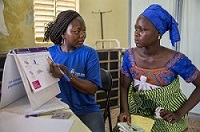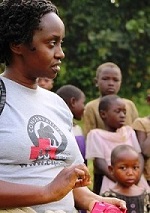Laying the foundation for the Family Planning and Environmental Sustainability Assessment in 2014 and early 2015, we contacted experts with some experience in both fields for guidance — and their takes on the state of research connecting family planning, population, and environmental sustainability.
This article is excerpted from the upcoming report of the findings of the Family Planning and Environmental Sustainability Assessment. A list of experts the author interviewed and their affiliations will be included in the report.
There aren’t many such experts, but they can be found. Defying the disciplinary walls that separate reproductive health from the environmental sciences, a small group of researchers has delved over the past few decades into possible connections between these two fields. Many of those we interviewed contributed significantly to the design of our search for scientific evidence on the linkages.
Logic and research suggest that growing populations tend to contribute to various environmental stresses. So, by extension, if wider use of family planning slows population growth, it should generally produce some benefits in slowing the pace of human-caused environmental change. Experts agreed, however, that this relationship is complex, under-researched, and not well or uniformly documented.
Reproductive health, family planning, population, and the state of the environment interact in individual human lives—sometimes intensively, especially in low-income communities where livelihoods are closely linked to local natural resources. However, research (and the funders behind it) rarely examines this integrated dynamic. In the professional development community, demography, health, and individual environmental topics typically fall into silos, reflecting the disciplinary specialty of researchers or the focus of funders.
"We need to establish this as a new field of research study … because you can’t solve new problems with old ways of thinking."
|
In developing countries, some community-based programs work to improve family planning access and natural resource conservation at the same time. But experts noted that even where there are evaluations of such population, health, and environment (PHE) programs, they may not be widely published or otherwise communicated, especially in peer-reviewed journals. This results in lost opportunities for information sharing in research communities that are potentially interested in the connection between family planning and environmental sustainability (FP-ES)—as well as in policy and advocacy circles and in the PHE program community itself.
There is a natural tension between research and community well-being when documenting the effectiveness of PHE programs. The urgency of addressing problems on the ground—such as poor management of natural resources or limited access to reproductive health services—calls for near-term results, with less attention to longer-term efforts to improve scientific understanding of what works, how, and why. Undergoing peer review becomes even less likely under such funding and under time pressure to “just do it,” with or without documentation and evaluation.
“If I had to identify a gap in attention to population-environment and FP-ES issues universally, the need for more peer-reviewed research on these integrated topics would be it,” noted Dr. Mark Montgomery, a senior associate at the Population Council and professor of economics at Stony Brook University in New York.
Several experts suggested that the integrated character of FP-ES connections is a hindrance to research, requiring as it does holistic observation and data collection that few experts receive training to do and that few funders are accustomed to supporting. Data points add up differently, and units of analysis differ, complicating measurement and assessment of their interactions.

A mobile clinical outreach team from Marie Stopes International, a specialized sexual reproductive health and family planning organization, on a site visit. August 14, 2014 in Laniar Senegal. (Photo by Jonathan Torgovnik/Reportage by Getty Images).
|
“The community working on FP-ES is mainly advocates, policy specialists, campaigners, and journalists—but not researchers,” noted Dr. Lynne Gaffikin, a medicine and public health associate professor at Stanford University. “We need to cultivate researchers and provide the money [to support their work]. We need to establish this as a new field of research study, a new way of thinking, because you can’t solve new problems with old ways of thinking.”
Despite a considerable volume of literature analyzing or at least drawing attention to population-environment linkages, very little of this research takes the additional step of asking if family planning is an option for addressing the connection. Several experts interviewed noted the relative absence of any mentions of reproductive health and family planning—or, for that matter, other potential topics related to population change, such as education and the status of women.
On a positive note, some experts pointed to recent increases in the application of monitoring, evaluation, and increasing the evidence base, and occasionally even peer review, in PHE programs, which may indicate increasing interest in these areas among funders and national governments.
“The next logical step . . . is evidence gathering and peer-reviewed research and publication,” said Leona D’Agnes, former technical adviser at PATH Foundation Philippines and an independent consultant on integrated PHE. “This doesn’t mean it wasn’t seen as important [before]. We just weren’t there yet because of the program focus, but now we are. The key is harnessing donors to understand that FP-ES linkages are the logical next step to the existing population-environment research, so we have support to take our work to the next level. We’re on the ground and see the dynamics and the research needs. Our job is to help the funders see where we are now and what is needed.”
"The next logical step . . . is evidence gathering and peer-reviewed research and publication."
|
Among the key themes expressed by experts interviewed was a call for more, better research relating family planning and environmental sustainability. The experts suggested the need to identify priority FP-ES research needs, build a strategy, and follow up with compelling proposals for funding. Researchers should consider pilot studies, then scale up. They should take advantage of existing in-country projects that could offer potential partners and research locations and engage developing-nation researchers along with those from developed countries.
“The lack of research doesn’t mean a lack of linkages,” said Dr. Gaffikin. “We have to help the international donors see the link and that the integrated approach . . . is the emerging trend now.”
Combining peer-reviewed research on FP-ES linkages with operations research on PHE programs could benefit both researchers and field practitioners, some experts argued. In-country practitioners typically do not have the capacity to both implement programs and conduct research. But many, having conducted what they see as successful programs, now want to enhance their research documentation, publication, and dissemination. One possibility may be to link authors that have peer-reviewed papers under their belt, to those interested in pilot studies in PHE as practiced in communities.

CTPH Founder and CEO
Dr. Gladys Kalema-Zikusoka educating the community on conservation and public health. Photo by Charles Capel.
|
“Many in-country NGOs [non-governmental organizations] who are currently undertaking or want to undertake program work want it to be informed by science,” said Dr. William Pan, an assistant professor of environment and health at Duke University. “But they can’t do both [program work and scientific research].”
Dr. Pan cited the Ugandan organization Conservation through Public Health (whose founder and CEO Gladys Kalema-Zikusoka is a member of the FPESA network of assessors) as an illustration of how successful PHE project work can attract attention from governments and international development assistance agencies. “Yet most NGOs who deal with these integrated issues are not always informed by science, and this is a problem that needs to be addressed. This is key, because NGOs’ role is to do what science alone cannot, to focus on policy and advocacy. We need to bridge the scientist/activist divide.”
How to move forward? Experts generally agreed that research should explore how family planning relates to forces and factors that can bring about environmental sustainability. They also agreed that this needs to be integrated with the study of what works to improve livelihoods, food security, education, economic opportunities, and the empowerment of girls and women.
Several interviewees noted the potential of the FPESA project itself to draw attention to the need to better integrate peer-reviewed research with PHE programs, to expand and diversify the community of engaged researchers, and to prioritize research needs. One priority, many said, is to work to convince potential funders about the importance of building the research on the linkage between family planning and environmental sustainability.
ABOUT THE AUTHOR
Vicky Markham is founding director of the Center for Environment and Population, a U.S.-based non-profit organization that addresses human and environmental interactions through research, policy, advocacy, field work, and youth engagement. She is a consultant to the Worldwatch Institute’s Family Planning and Environmental Sustainability Assessment project.
|